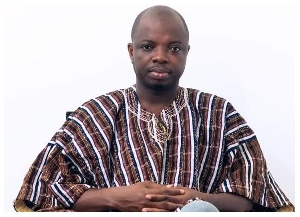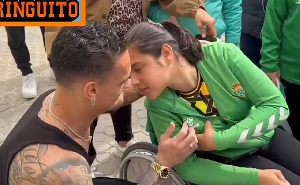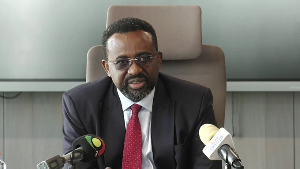The incidence of brutalities by some members of the public, some police officers and some military personnel is nothing to write home about. Today in Ghana, everyone seems to be doing what he thinks it is fit in his own eyes with little or total disregard for the laws of the land. Interestingly, while some security personnel are brutalising some members of the public, the incidence of the vice versa is regrettably emerging. It must be indicated that both sets of people are culpable of breaching the inalieriable rights of the individuals involved.
THE TELEKU-BOKAZO BRUTALITY
On Sunday, October 7, 2007 two policemen were seriously wounded by some youth of Teleku-Bokazo and Anwia in the Nzema East District of the Western Region. This happened when the said youth allegedly went on rampage to protest a purported surface mining activity and to prevent Adamus Resources Limited from resettling the inhabitants who feared they will lose their cultural identity and also have their water bodies polluted. Consequently, Constable Opoku Agyemang and L/CP/ Appiah sustained machete wounds. Vandalism was the order of that day.
Commendably, a crusade led by The Chronicle Newspaper has condemned in no uncertain terms the above alleged uncivilized conduct by the youth in the Nzema East District. The alleged report should however be accorded with a full–fledged investigation after which those who would be implicated will be made to face the appropriate punishment. It should not be ignored that police officers also have rights as human beings. They should be seen as human beings before being seen as policemen. Human rights are the generally accepted principles of fairness and justices inherent in every individual by virtue of their humanity. ALL HUMAN BEINGS are born free and equal in dignity and rights. They are endowed with reasoning and conscience and should act towards one another in a spirit of brotherhood. Therefore, inasmuch as we will hold the police accountable for any human right abuse; we should also refrain from doing anything that endangers their rights.
POLICE BRUTALITY IN KUMASI IS RIFE
In late April 2007, Nana Kwame Saropong under mysterious circumstances died in the Kumasi Police cells upon his arrest for an alleged suspicion of theft. We are patiently waiting for the decision of the CHRAJ on this sad case. Coincidentally, the very day that some youth at Nzema District were allegedly brutalising the two police officers, a 29-year-old man, Ayerefo Kantinka, was arrested and cast into Kumasi central police cells for alleged theft. The late Ayerefo Kantinka was allegedly kept in the cells for three days without bail. Expectedly, the police initially told the relatives of the deceased that the suspect was indisposed and upon his being rushed to the Komfo Anokye Hospital he died. However, the relatives of the deceased are disputing the claims. Their assertion has been confirmed by a trusted police source that the suspect died in cells. (Source: myjoyonline [2007-10-10 17:54:23). According to the report, Mr. Ayerefo was brutalised by some police personnel, resulting in his death. While still waiting for the report of the investigation launched by the Ashanti Regional Command into the alleged killing of a 26-year-old man, Kofi Ketewa, at Tanoso in Kumasi which occurred on Thursday, July 12, 2007, we once again call on the police in Kumasi to undertake a diligent and faithful investigations to establish the true cause of Mr. Ayerefo’s death. In a related development, the alleged illegal detention by Suame Police Station in Kumasi kills and maims the other. According to the Public Agenda Friday Edition, October 12, 2007 sometime around May 29 or 30, 2007 two persons-one Atta , an adult, and Samson Kojo, a 14-year-old boy were arrested in Basa, near Kwame Danso in the Sene district and brought down to Kumasi on alleged stealing charges. A third person, Kofi Kumah was arrested later as an accomplice. The suspects were accordingly brutalised with belts and batons while handcuffed. They were kept in custody for one month in the case of Atta and Samson. Kofi was in custody for 10 days.MR. AYEREFO’S EPISODE
Mr. Ayerefo’s episode is the eighth reported case of alleged police brutality this year alone. Out of this number, three of them happened in Kumasi. Sadly enough, all the three suspects died under mysterious circumstances some few days after their arrest and detention.RIGHT TO HEATH
Kwame Sarpong and Ayerefo’s allegedly died due to ill-heath-the police are saying so. It is however settled that law enforcement officials shall ensure the full protection of the health of persons in their custody and, in particular, shall take immediate action to secure medical attention for the arrestees and detainees whenever required. Assuming that the above suspects died as a result of ill-heath (though I have some reservations), we believe that if the above duty was carried out, these untimely deaths could have been reversed.Interestingly, the two police officers who were allegedly assaulted by some youth in Nzema East District were, without delay, rushed to the nearest hospital to receive medical attention. The potent question is whether the police accord suspects who may need prompt medical attention the same treatment as they do for their comrades. The principle of equality of application of the law requires that police and security officers will not discriminate against any person.
Brutality occurs any time we fail to observe and respect any basic right of an individual. The detention of Messrs Ayerefo, Kofi Nkrumah and one Atta in Kumasi for more than 48 hours is a clear example of police brutality. The episode at Nzema East District is an example of worst form of civil disobedience. These illegal conducts undermine the most fundamental freedoms of all, including the right to dignity and liberty. Civil brutality or police brutality therefore has negative implications for human rights, meaningful access to justice, and public faith in the justice system as well as accountable state security services in a democratic system.
CONCLUSION
The Ministry of Interior is doing well to address the rampant report of police brutalities in the country. However, more practical steps should be taken to save the lives of Ghanaians from these unlawful deeds. It is furthermore submitted that the police-civilian relationship should be revised. There should also be more comprehensive human rights focused-training for the police service.



















